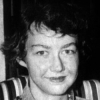Flannery O'Connor

Flannery O'Connor
Mary Flannery O'Connorwas an American writer and essayist. An important voice in American literature, she wrote two novels and 32 short stories, as well as a number of reviews and commentaries. She was a Southern writer who often wrote in a Southern Gothic style and relied heavily on regional settings and grotesque characters. Her writing also reflected her own Roman Catholic faith and frequently examined questions of morality and ethics. Her posthumously-compiled Complete Stories won the 1972 U.S. National Book...
NationalityAmerican
ProfessionNovelist
Date of Birth25 March 1925
CitySavannah, GA
CountryUnited States of America
She would of been a good woman," said The Misfit, "if it had been somebody there to shoot her every minute of her life.
It's easier to bleed than sweat, Mr. Motes.
Anything that comes out of the South is going to be called grotesque by the northern reader, unless it is grotesque, in which case it is going to be called realistic.
Anybody who has survived his childhood has enough information about life to last him the rest of his days.
Only if we are secure in our beliefs can we see the comical side of the universe.
I love a lot of people, understand none of them...
I don't think literature would be possible in a determined world. We might go through the motions but the heart would be out of it. Nobody could then 'smile darkly and ignore the howls.' Even if there were no Church to teach me this, writing two novels would do it. I think the more you write, the less inclined you will be to rely on theories like determinism. Mystery isn't something that is gradually evaporating. It grows along with knowledge.
Writing a novel is a terrible experience, during which the hair often falls out and the teeth decay. I'm always irritated by people who imply that writing fiction is an escape from reality. It is a plunge into reality and it's very shocking to the system.
Tennessee's a hillbilly dumping ground, and Georgia's a lousy state too.
Our age not only does not have a very sharp eye for the almost imperceptible intrusions of grace, it no longer has much feeling for the nature of the violences which precede and follow them.
He and the girl had almost nothing to say to each other. One thing he did say was, 'I ain't got any tattoo on my back.' 'What you got on it?' the girl said. 'My shirt,' Parker said. 'Haw.' 'Haw, haw,' the girl said politely.
The old woman was the kind who would not cut down a large old tree because it was a large old tree.
She was a talker, wasn't she?" Bobby Lee said, sliding down the ditch with a yodel. "She would of been a good woman," The Misfit said, "if it had been somebody there to shoot her every minute of her life." "Some fun!" Bobby Lee said. "Shut up, Bobby Lee," The Misfit said. "It's no real pleasure in life.
He loved her because it was his nature to do so, but there were times when he could not endure her love for him. There were times when it became nothing but pure idiot mystery...